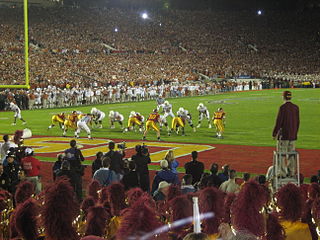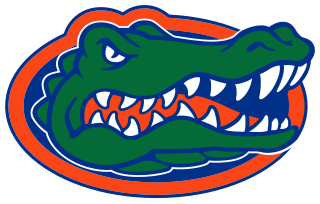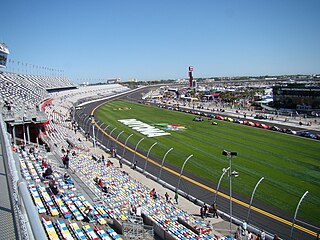
The Atlantic Coast Conference (ACC) is a collegiate athletic conference located in the United States. Headquartered in Charlotte, North Carolina, the ACC's eighteen member universities compete in the National Collegiate Athletic Association (NCAA)'s Division I. ACC football teams compete in the NCAA Division I Football Bowl Subdivision. The ACC sponsors competition in twenty-eight sports with many of its member institutions held in high regard nationally. Current members of the conference are: Boston College, California, Clemson, Duke, Florida State, Georgia Tech, Louisville, Miami, North Carolina, NC State, Notre Dame, Pittsburgh, SMU, Stanford, Syracuse, Virginia, Virginia Tech, and Wake Forest.

In North America, a bowl game, or simply bowl, is one of a number of postseason college football games primarily played by NCAA Division I Football Bowl Subdivision (FBS) teams. For most of its history, the FBS did not use a playoff tournament to determine an annual national champion, instead relying on a vote by sportswriters or coaches. In place of such a playoff, cities developed regional festivals featuring bowls. Prior to 2002, bowl game statistics were not included in players' career totals. Despite moves to establish a permanent system to determine the FBS national champion on the field — such as the Bowl Coalition from 1992 to 1994, the Bowl Alliance from 1995 to 1997, the Bowl Championship Series from 1998 to 2013, and the College Football Playoff from 2014 through the present — some bowls are still held.

The Florida State Seminoles are the athletic teams representing Florida State University located in Tallahassee, Florida. They compete as a member of the National Collegiate Athletic Association (NCAA) Division I level, primarily competing in the Atlantic Coast Conference (ACC) for all sports since the 1991–92 season; within the Atlantic Division in any sports split into a divisional format since the 2005–06 season.

The Florida Gators are the intercollegiate athletic teams that represent the University of Florida, located in Gainesville. The University of Florida, its athletic program, its alumni and its sports fans are often collectively referred to as the "Gator Nation." The Gators compete in the National Collegiate Athletic Association (NCAA) and the Southeastern Conference (SEC) and are consistently ranked among the top college sports programs in the United States. The University of Florida currently fields teams in nine men's sports and twelve women's sports.

The Tennessee Volunteers and Lady Volunteers are the 20 male and female varsity intercollegiate athletics programs that represent the University of Tennessee in Knoxville, Tennessee. The Volunteers compete in Division I of the National Collegiate Athletic Association (NCAA) as a member of the Southeastern Conference (SEC). In January 2021, Danny White was introduced as the Volunteers' Director of Athletics.
The Syracuse Orange are the athletic teams that represent Syracuse University. The school is a member of NCAA Division I and the Atlantic Coast Conference. Until 2013, Syracuse was a member of the Big East Conference.

The Miami Hurricanes, known informally as The U,UM, or The 'Canes, are the intercollegiate sports teams that represent the University of Miami in Coral Gables, Florida. The Hurricanes compete in Division I of the National Collegiate Athletic Association, the highest level of collegiate athletics. The University of Miami's football team has won five national championships and its baseball team has won four national championships. Across all sports, the Hurricanes have won 21 national championships and 83 individual national championships.

The South Florida Bulls are the athletic teams that represent the University of South Florida. USF competes in NCAA Division I and is a member of the American Athletic Conference for all sports besides sailing, a non-NCAA sanctioned varsity sport which competes in the South Atlantic Intercollegiate Sailing Association within the Inter-Collegiate Sailing Association. Additionally, the school will become an affiliate member of Conference USA in the sport of beach volleyball beginning in 2025 because the American Athletic Conference does not sponsor the sport. The current athletic director is Michael Kelly, who has held the job since 2018. The school colors are green and gold and the mascot is Rocky D. Bull.

The UCF Knights are the athletic teams that represent the University of Central Florida in unincorporated Orange County, Florida near Orlando. The Knights participate in the National Collegiate Athletic Association's (NCAA) Division I as a member of the Big 12 Conference. Since men's soccer is not sponsored by the Big 12, they play in the Sun Belt Conference.

The Tampa Spartans are the athletic teams that represent the University of Tampa, located in Tampa, Florida, in NCAA Division II intercollegiate sports. The Spartans compete as members of the Sunshine State Conference for all sports besides beach volleyball and track and field, which compete as independents. Tampa has been a member of the conference since 1981.
Jacksonville is home to a number of professional sports teams, and the city has a long history of athletics. The Jacksonville Jaguars of the National Football League (NFL) compete at the major league level. Additionally, the PGA Tour is headquartered in the suburb of Ponte Vedra Beach, where it hosts The Players Championship every year. All Elite Wrestling, the second-largest professional wrestling promotion in the U.S. behind WWE, has its headquarters in the Jaguars' stadium, largely due to its shared ownership with the Jaguars.

The U.S. state of Florida has three National Football League teams, two Major League Baseball teams, two National Basketball Association teams, two National Hockey League teams, two Major League Soccer teams and 13 NCAA Division I college teams.

The FIU Panthers are the athletic teams representing Florida International University, an American public university located in Miami, Florida. The Panthers currently compete in National Collegiate Athletic Association (NCAA) Division I athletics as members of Conference USA. The men's soccer and swimming & diving teams compete in the American Athletic Conference. Until 2011, they were known as the FIU Golden Panthers.
The 1971 NCAA soccer tournament was the 13th annual tournament organized by the National Collegiate Athletic Association to determine the national champion of men's college soccer among its members in the United States. This was the final championship before the establishment of separate championships for the NCAA's University Division and College Division in 1972.
The 1973 NCAA Division I soccer tournament was the 15th annual tournament organized by the National Collegiate Athletic Association to determine the national champion of men's college soccer among its Division I members in the United States. Beginning with this season, the NCAA changed its classification system, and the former University Division was rebranded as Division I.
The 1978 NCAA Division II Soccer Championship was the sixth annual tournament held by the NCAA to determine the top men's Division II college soccer program in the United States.
The 1979 NCAA Division II Soccer Championship was the eighth annual tournament held by the NCAA to determine the top men's Division II college soccer program in the United States.
The 1980 NCAA Division II Soccer Championship was the ninth annual tournament held by the NCAA to determine the top men's Division II college soccer program in the United States.
The 1982 NCAA Division II soccer tournament was the 11th annual tournament organized by the National Collegiate Athletic Association to determine the national men's college soccer champion among its Division II members in the United States.
The 1985 NCAA Division II Soccer Championship was the 14th annual tournament held by the NCAA to determine the top men's Division II college soccer program in the United States.










